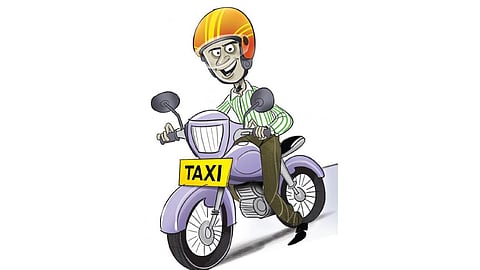

BENGALURU: In the backdrop of the Karnataka High Court directing bike taxi aggregators to wind up their operations within six weeks, people who rely on these services say they are the cheapest and quickest mode of transport, compared to autos, Metro and cabs.
The New Indian Express spoke to some bike taxi users and mobility experts. While users batted for laying down regulations which bike taxi operators have to follow, mobility expert from Indian Institute of Science (IISc) Ashish Verma opined that a comprehensive study and understanding are needed before banning bike taxis.
Balachandar, a techie who regularly swaps bike taxis for BMTC buses, said no other mode of transport offers the convenience that bike taxis do. “To catch a bus or get into the Metro, I have to walk from my home for over 10 minutes. If I book an auto, they look at the pick-up location and don’t accept rides, as they generally don’t intend to navigate through narrow streets. Bike taxis not only immediately accept my rides, but are the cheapest.”
At any given time, bike taxis are cheaper by around 30 per cent compared to autos, he said. Another big reason to opt for bike taxis are “Bengaluru’s infamous traffic jams” where bike taxis can travel faster than autos and cabs. He said on many occasions he was fed up waiting for BMTC buses at bus stops, and would then head out to book a bike taxi as he had to reach his destination on time.
This has been the case for most bike taxi users, who opt for the cheapest and quickest commute in the city. Bike taxi users said the government must regulate taxis with a clear framework as they are helpful to them, and at the same time, provide employment opportunity to the riders.
While the Maharashtra government recently permitted e-taxi operations and Tamil Nadu government imposed a ban and revoked it, bike taxi operations is facing legal challenges in India. In under-developed and developing countries, bike taxis are widely prevalent and used as first and last mile connectivity option.
Mobility expert Prof Ashish Verma said bike taxis have both desirable and undesirable aspects. “While bike taxis provide a convenient, fast and economical last/first-mile option to public transport, the driving behaviour of bike taxi drivers poses road safety fears. Further, safety concerns about women users while availing bike taxi rides also needs attention.”
Professor and convener, IISc Sustainable Transportation Lab (IST Lab), Verma pushed for a more comprehensive study and understanding before banning bike taxis. He stated that along with the evolving landscape of mobility options, our Motor Vehicle Act and rules should also evolve with time.